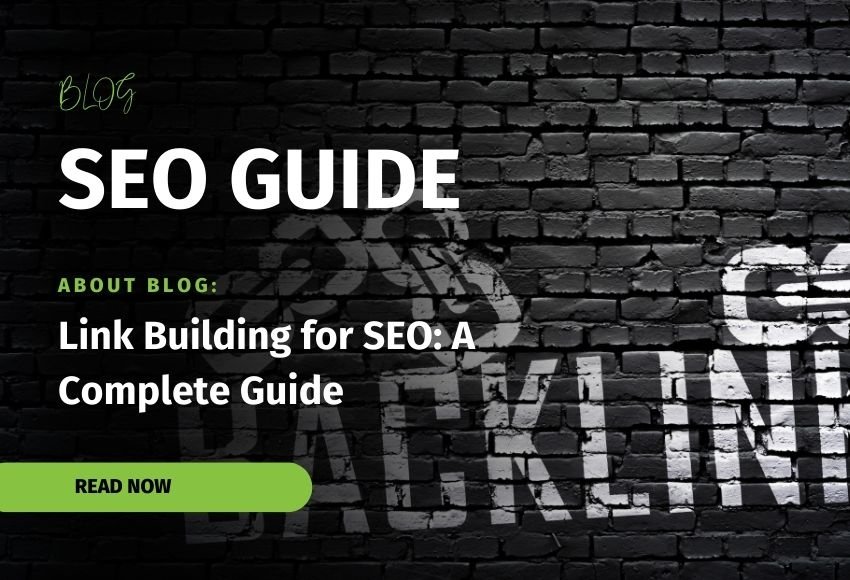
Link Building for SEO: A Complete Guide
Ever wondered how to get your website noticed by more people?
The answer lies in a powerful strategy called link building.
In the Search Engine Optimization (SEO) world, link building is like paving digital pathways that lead straight to your site. It's about creating connections and relationships that tell search engines and users alike,
“Hey, this is a site worth visiting!”
In this comprehensive guide, we're going to dive into the fascinating world of link-building for SEO. We'll explore its importance, different types of links, strategies, and much more.
So whether you're a newbie or an experienced webmaster, buckle up and prepare to embark on an SEO journey that could transform your website's online visibility!
Understanding SEO

SEO stands for Search Engine Optimization. Think of it like a set of rules. It helps to make websites easier for search engines to understand. It's all about improving your site for people looking for information.
In SEO, link building plays a big role. This means getting other websites to have a link that points to your website.
It's like saying, “Hey, this website is good! You should check it out!”
When more quality websites link to your site, search engines like Google think,
“Hmm, this website must be pretty good.”
That can help your website show up higher in search results.
Read More: What Is SEO in Digital Marketing & How Does It Work?
What is Link Building?
So, what exactly is link building? It's simple, really. Link building is the process of getting other websites to link to your own. It's a way of telling search engines, “This website is trustworthy and has good stuff.”
How does it work?
You might create great content that others want to link to. Or, you might reach out to other websites and ask them to link to you. Sometimes, you might even offer to write a guest blog post for another site and include a link back to your site.
Why are high-quality links important?
Well, not all links are created equal. Links from respected and trusted websites matter more. These quality links can help your site become more visible in search results.
Types of Links
There are a few different types of links you should know about.
Backlinks:
These are the links on other websites that point back to your site. They're important in SEO because they show your site has good information.
Internal links:
These are links that go from one page on your website to another page on the same website. They help people and search engines navigate your website.
External links:
These are links from your website to a different website. They're useful for providing more information or for showing where you got your information.
DoFollow vs NoFollow links:
When a website links to another website, it can choose to give a “DoFollow” or a “NoFollow” tag to the link.
A “DoFollow” link tells search engines to consider it when figuring out search rankings.
A “NoFollow” link says,
“Don't count this one for rankings, but people might still want to go here for more information.”
Understanding these different types of links can help you build a stronger SEO strategy and get more people to visit your website.
Read More: 7 Powerful SEO Link-building Strategies
Why Link Building is Important for SEO
Link building helps your website in several ways. Let's talk about a few:
Impact on Search Engine Rankings:
Search engines, like Google, use links to find out what content on your website is related and the value of that content. If many quality websites link to your site, Google thinks your site must be high-quality too. This can help your site rank higher in search results.
Building Authority and Credibility:
When many reputable websites link to your site, it shows your website is trusted and has good information. This helps to build your website's authority and credibility.
Driving Referral Traffic:
Besides SEO, links can also direct visitors from other websites to visit your site. This is called referral traffic. If someone likes what they read on another site and it links to your site, they might click the link to learn more.
Link Building Strategies
Here are some strategies that you can use to get more links:
Content Creation & Promotion:
One way to get links is to create good content that people want to link to. After you create it, you need to promote it. You might share it on social media or email it to other website owners who might be interested.
Guest Blogging:
Another way to get links is by writing a blog post for another website. You can include a link to your site in your blog post.
Broken Link Building:
This strategy involves finding broken links on other websites and suggesting your content as a replacement. It's a win-win because it helps the other website fix a problem and gives you a new backlink.
Skyscraper Technique:
This is when you find a popular piece of content, create something even better, and then reach out to the right people. The goal is to get people who linked to the original content to link to your new and improved version instead.
Influencer Outreach:
This means reaching out to influencers in your industry and asking them to share your content. If they do, their followers might link to your content too.
Remember, the goal isn't just to get more links. It's to get more high-quality links. These strategies can help.
Ethical Link Building
Ethical link-building means doing things the right way. Some people try to cheat the system to get more links. This is called black hat SEO. It might give a quick boost, but it can also lead to trouble. Search engines could penalize your site or even remove it from their listings.
Instead, it's important to focus on white-hat SEO tactics. These are ethical methods that follow search engine rules. For example, creating high-quality content that naturally earns links or building relationships with other reputable websites.
Tools for Link Building
There are several tools that can help you with link building:
SEO Tools for Link Analysis:
These tools can show you who is linking to your site and how valuable those links are. Some popular ones include Moz, SEMrush, and Ahrefs.
Outreach Tools:
These tools can help you find people who might be interested in linking to your site. They can also help you manage your communication with them. Examples include BuzzStream and Hunter.
Backlink Checker Tools:
These tools let you check the number of backlinks to your site. They can also show you the number of backlinks to your competitors' sites. Some examples are the backlink checkers in Moz, SEMrush, and Ahrefs.
Monitoring Your Link-Building Efforts
Monitoring means keeping track of your backlinks and how they affect your SEO.
Tracking Your Backlinks:
Keep an eye on who's linking to you.
Are they high-quality sites?
Are the links still active?
Evaluating the Quality of Your Links:
Not all links are created equal. A link from a trusted site is more valuable than a link from a low-quality site.
SEO Metrics to Watch:
Watch for changes in your search rankings. Also, keep an eye on your site traffic. If these numbers go up, your link-building efforts might be working!
Common Link-Building Mistakes to Avoid
Be careful to avoid these common link-building mistakes:
Link Schemes:
These are ways of tricking search engines into thinking your site is more important than it is. Avoid them!
Buying Links:
Paying for links is against search engine rules. It's better to earn links through good content and building relationships.
Spammy Links:
These are links from low-quality sites or sites that aren't related to your content. They can hurt your SEO rather than help it.
By avoiding these mistakes and using ethical link-building practices, you can help improve your site's SEO.
The Future of Link Building
SEO is always changing because search engines keep updating how they rank websites. These are called SEO algorithms. In the future, the way we build links may also change. It's important to stay updated so you can adjust your strategies as needed.
E-A-T is becoming important, which stands for Expertise, Authority, and Trustworthiness. Search engines want to show sites that have reliable and high-quality information. To show E-A-T, you might need to get links from other sites that recognize you as an expert in your field.
FAQs
What is link building, and why is it important for SEO?
Link building is when you get other websites to link to your site. It's like getting a thumbs-up in the digital world. It's important for SEO because search engines like Google use these links to figure out which sites have good information. If many trusted sites link to your site, search engines think your site is also trustworthy. This can help your site show up higher when people search for certain words or phrases.
What are some good strategies for link-building?
There are many strategies you can use for link building. One is creating great content that others want to link to. Another is writing a blog post for another website and including a link back to your site. You can also find broken links on other sites and suggest your content as a replacement. Finally, reaching out to influencers in your industry and asking them to share your content can also help you earn links.
What mistakes should I avoid in link building?
Be careful not to fall into traps like link schemes, which are ways of trying to trick search engines. Also, don't buy links. It's against search engine rules and can get your site in trouble. And be aware of spammy links, which are links from low-quality sites. They can actually hurt your SEO instead of helping it. Remember, the goal is to build high-quality links that improve your site's trustworthiness and visibility.
Conclusion
So, let's recap. Link building is when you get other websites to link to your site. It's a key part of SEO because it can help your site rank higher in search results, show your site is trustworthy, and bring more visitors to your site.
There are many strategies for link building, such as creating great content, guest blogging, and reaching out to influencers. There are also tools that can help you, like SEO tools for link analysis, outreach tools, and backlink checkers.
But remember, it's important to build links in the right way. Avoid tricks like link schemes and buying links. Instead, focus on building relationships and creating content that people want to link to.
The future of link building might change as SEO changes, but the basics will likely stay the same. Continue learning and adjusting your strategies as needed. Remember, good SEO is a marathon, not a sprint. Keep going, and you'll see the results of your hard work!
Thanks for reading this guide on link building for SEO. I hope you've learned a lot and are ready to start building some great links!
Seeking the finest SEO Services in Pakistan? ManagingSEO is the answer to all your digital marketing needs.

Leave a Comment